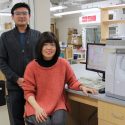Work transforms rodent virus into vaccines
The cardiovirus is a genetic pauper. With just a handful of genes — a mere dozen — the cardiovirus goes about its business of infecting rodents, and anything else that, deliberately or not, eats rodents.
But the extraordinarily simple genetic landscape that defines these microbes, makes a cardiovirus one malleable germ. Several years ago, virologist Ann Palmenberg found a way to strip out the pathogenic or disease-causing segment from this virus. The result was a live vaccine that has been used in zoos to vaccinate everything from elephants to monkeys, nearly 100 species of animals that may come in contact with the virus, an encounter that otherwise can be debilitating or fatal to the poor animal that unintentionally eats a dead mouse in a trunk full of grain.
Building on that success, Palmenberg and her colleagues, especially graduate student Joe Binder, have now figured out how to amplify the utility of these small bundles of genes. By replacing the disease-causing segment of the cardiovirus’ genome with genes that make proteins from other disease-causing agents, Palmenberg has transformed the lowly cardiovirus into a potential multipurpose vaccine.
“You can insert any gene you like,” says Palmenberg.”Whatever you design,” genes that can trigger an immune response to a host of human and animal afflictions from malaria to HIV.
What’s built in, preferably, is a gene that codes for an antigen, a structure that sits on the surface of an invading cell or virus, and that, when read by an animal’s immune system, alerts the host’s natural defenses to take action. The result is a lifelong immune response, protecting the inoculated animal from the disease pathogen whose antigen gene has been engineered into the cardiovirus.
The new vaccines could one day be used in humans as well as animals, Palmenberg says. For humans “we believe our vaccines are many times safer than polio vaccines. But so far, we’ve mostly tested new veterinary vaccines.”
The patents for Palmenberg’s novel vaccine technology are held by the Wisconsin Alumni Research Foundation.
Tags: biosciences, research



